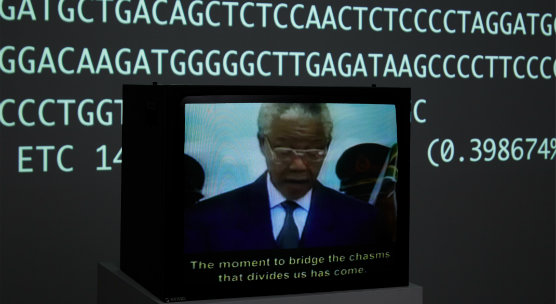‘Poetry Machine’ exploring the human genome project on view at the site of its decoding
Published On Fri 7 Oct 2016 by Grant Hill

A unique artwork commissioned by the University of Dundee that explores the human genome has gone on display at the UK home of the Human Genome Project for the first time.
Stutterer, created by renowned visual artists Thomson & Craighead, both graduates of Dundee, together with computational biologists in the School of Life Sciences was originally commissioned in 2014 by the University’s LifeSpace Science Art Research Gallery. It will go on display at the Wellcome Genome Campus in Cambridge from Friday, 7th October until January next year.
The work, which the artists call a ‘poetry machine’, plays the 3.2 billion letters of the human genome like a musical score. As each letter plays out on one screen, the artwork randomly plucks a clip from English language media that was broadcast during the 13 years it took to sequence the first human genome and plays the clip on a second screen. Its only condition is that the speech in the clip begins with an A, C, G or T, to match the letters that represent DNA.
Stutterer, which was supported by a grant from the Wellcome Trust, highlights the scale of biological information contained in each of our cells. If the work played continuously it would run for 60 years. The work also highlights the rich period of history that was the backdrop to this monumental scientific project; from the 1990 release of Nelson Mandela, to the Iraq War in 2003.
The Human Genome Project was an international collaboration between 20 research institutes in six countries. The Wellcome Trust Sanger Institute based at the Wellcome Genome Campus was its UK hub and was also the project’s single biggest contributor, sequencing one-third of the genome.
Stutterer will be exhibited alongside objects from the Human Genome Project, including a DNA sequencing machine, which demonstrate the process of getting from an organic sample of DNA to the final string of letters visualised in the work.
Sarah Cook, curator of LifeSpace, said, “Stutterer has been seen by hundreds of people since it was first unveiled here in Dundee in 2014, being exhibited at The Lowry in Salford and in London before now heading to the Wellcome Genome Campus. It’s now read its way through just 0.7% of the code of the human genome so far.
“Given that Thomson & Craighead are also alumni of the University of Dundee, we are thrilled to have acquired this first edition of the work for the University’s Museum collection, and through its exhibition outwith Dundee, to partner with science research institutions to bring interdisciplinary contemporary art to new audiences.”
The Wellcome Genome Campus is home to some of the world’s foremost institutes and organisations in genomics and computational biology, committed to delivering life-changing science with the reach, scale and imagination to solve some of humanity's greatest challenges.
Curator of new exhibition Becky Gilmore said, “It is a great privilege to be able to bring Thomson & Craighead’s intriguing and thought-provoking work to the Wellcome Genome Campus. With Stutterer, the artists remind us that scientific endeavour does not happen in isolation. The Wellcome Genome Campus is a place of cutting-edge research but it is also a site of great scientific heritage. By exhibiting Stutterer, which offers much reflection on this achievement, it’s as if the artwork is returning home.
For media enquiries contact:
Grant Hill
Press Officer
University of Dundee
Nethergate, Dundee, DD1 4HN
Tel: +44 (0)1382 384768
Mobile: 07854 953277
Email: g.hill@dundee.ac.uk